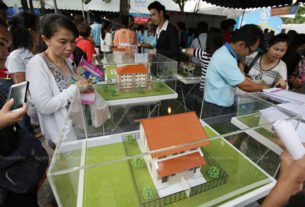Condominium developers are so concerned that the Environment Impact Assessment Committee is restricting approvals that all of them have decided to delay launching projects until they get the EIA permit.
“We will launch our condo projects when we get EIA permits. That will be safer for our business and our customers’ confidence,” Srettha Thavisin, president of Sansiri Plc, said yesterday.
Prasert Taedullayasatit, president of the Thai Condominium Association and managing director of Pruksa Real Estate Plc, said the association has tried to propose to the EIA committee to announce |EIA standards so that property firms can do their business. The process from applying for a EIA permit until receiving it takes from six months to one year depending on a project’s location and size.
For example, LPN Development Plc applied for a EIA permit for Lumpini Town Rangsit as early as the end of 2013 but did not get it until last month. The project had to be changed from only one phase with 10,000 units to three phases starting with 3,000 units, then 3,500 units and 3,500 units.
“We had to divide up our project when the EIA committee did not believe that only one phase could provide the facilities to cover all of the homeowners’ demand. That caused a delay in the launch of about one year from our business plan,” said Opas Sripayak, managing director of LPN Development Plc. After this problem, when the company launches condo projects now, it tries to apply for a EIA permit. That will be better for its business and its customers, he said.
AP (Thailand) Plc is also one of the property firms that have run into the EIA bump in the road. It used to start marketing a new condo project three months after acquiring land and building the sales office.
Now it waits for the EIA permit, which can take an average of three months to six or eight months, before launching condo projects, said Vitakarn Chantavimol, chief marketing officer.
Not only do developers have to worry about the EIA permit before launching a project, some of them also have to deal with problems when the community has questions and sues them even after the project’s EIA was approved.
For example, Aspire Ngam Wong Wan, a Bt2.8 billion project from AP (Thailand) Plc, had commenced construction with both EIA and building permits in hand, but ran into opposition from some community members. It is already 70 per cent built and is scheduled to be completed next year.
“We are going on with construction following our existing permit, and we are confident that we doing everything legal,” he said.
Thai Condominium Association president Prasert said the problems of the EIA permit, both the application process and after getting the permit, have to be solved. There has to be standards because that will give confidence to both developers and homebuyers.
Source: http://www.nationmultimedia.com/business/Developers-wait-for-EIA-permit-30252312.html
